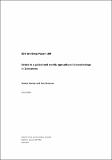| dc.description.abstract | Great claims are made both for and against the potential contribution of GMOs to the future of African
agriculture. This paper explores this, looking at what biotechnology might mean for agricultural and food
production systems in Zimbabwe. It focuses on two key crops, cotton and maize, and argues that choices
about possible biotechnology futures have to be understood in relation to trends towards globalisation
and liberalisation of the seed industry, and also shifts in the political economy of agriculture, both at home
and overseas. Assuming that there is support for some role for agricultural biotechnology in Zimbabwe,
and leaving aside questions of regulation, several key choices emerge, linked to four different future
scenarios: is it best to rely on market-supply of technologies from multinational corporations? Or should
Zimbabwe seek to develop technologies independently? Alternatively, if the latter is unrealistic, what
scope is there for the pursuit of a middle position, striking bargains with big corporations and pushing for
more locally appropriate forms of technology? Or, finally, are choices ultimately irrelevant with the most
likely outcome being that transgenic biotechnology essentially passes Zimbabwe by? Several factors are
identified that are key to these different scenarios, these include: technology choice; issues of technology
access and ownership; the – as yet uncertain – role of new farmers emerging as a result of land reform and
changes in the agrarian economy; the shifting dynamics of seed markets; changing industrial structure and
ownership patterns; new economic conditions and trends in international trade relating to GMOs. The
paper concludes that these contexts and trade-offs need to be brought more specifically into debates
about alternative GM or non-GM futures in Zimbabwe, and elsewhere in Africa, than has happened to
date. | en_GB |

